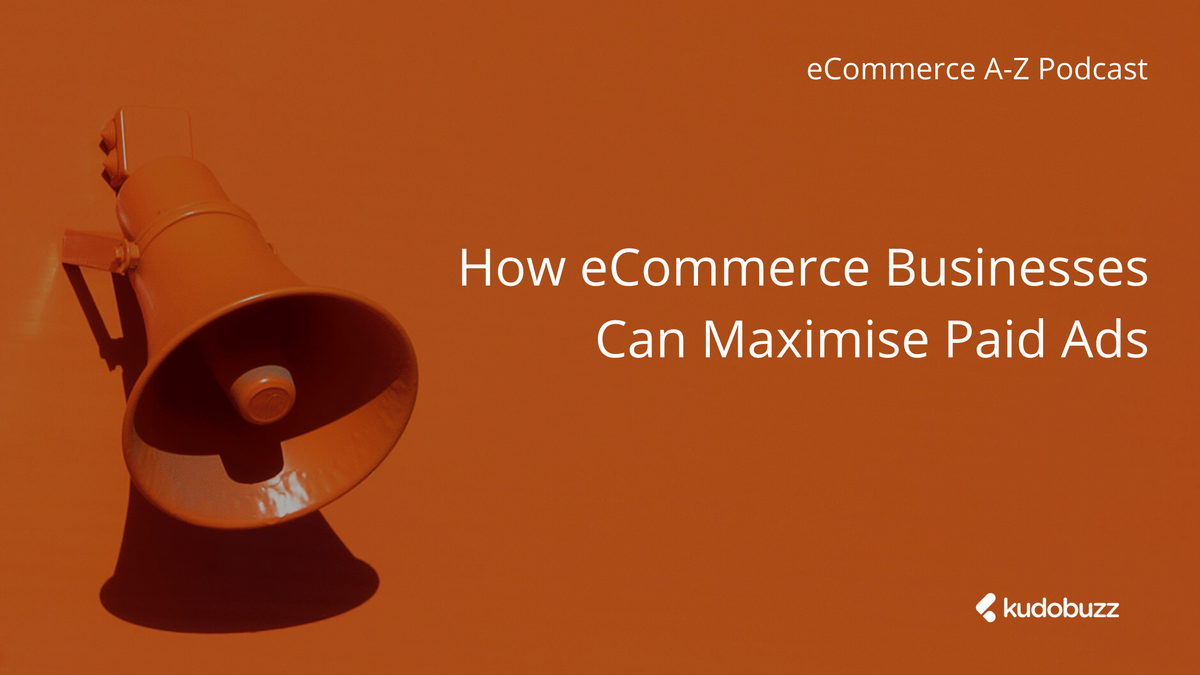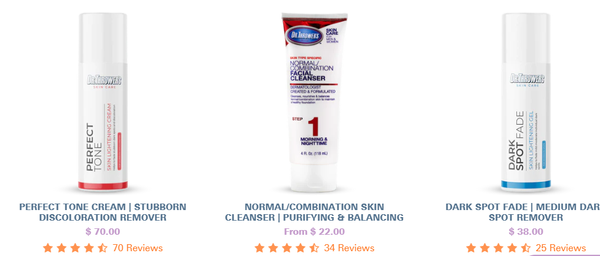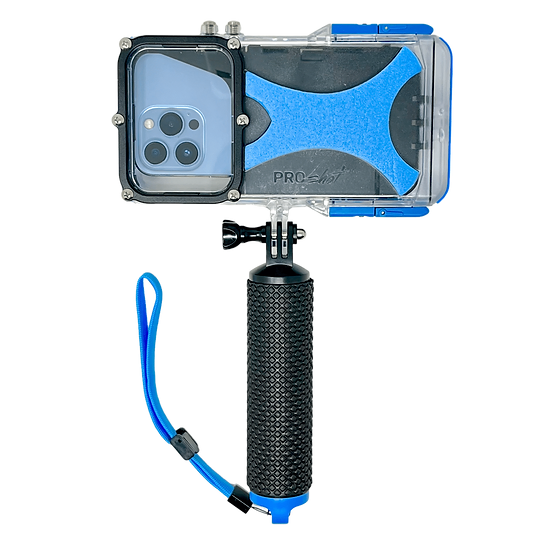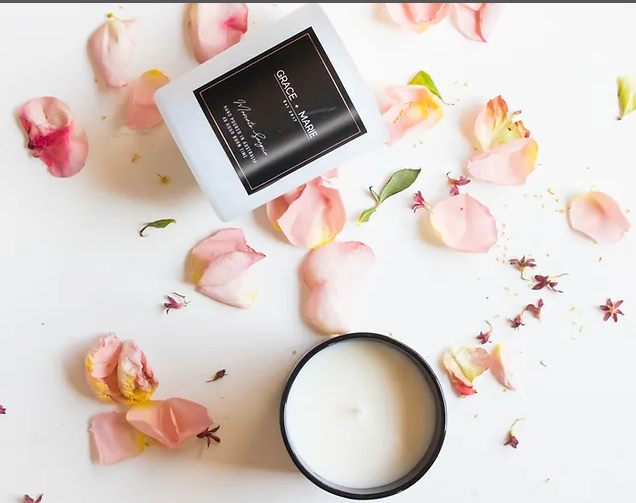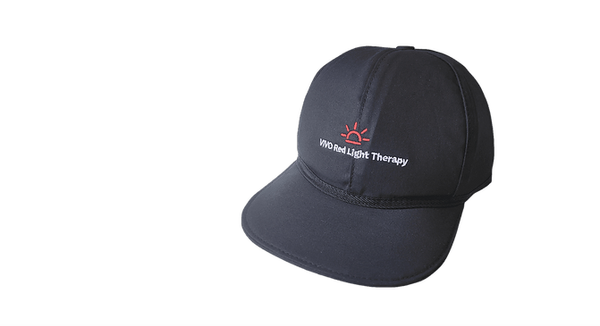In this episode, we speak to Marcus Knight, one of the co-founders of Prospect Knight, an audience marketing agency in London. Marcus is a Pay-Per-Click expert with a healthy obsession for marketing.
We discussed how eCommerce merchants can maximise paid ads to yield effective results. We touched on the ins and out of paid ads for platforms like Google, Facebook and Instagram and talked about proven strategies, budgeting, ad copy, visuals, duration of ads and others.
Introduction
If you are a high value fashion brand, where you are selling high priced stuff, and you are reaching people who are not really interested in that or people who don’t have, they might think it is cool but they might not really going to pay that much for it. It doesn’t matter how good your ad is, it's not going to work. So it comes back to having strong targeting along with the strong image that is going to stand out and catch someone’s attention.
Dzifa Mensah
Hi There, Welcome to the eCommerce A-Z podcast, where we teach you how to start and grow a thriving eCommerce business.
In this episode, we speak with Marcus Knight, one of the co founders of Prospect Knight, an audience marketing agency in London. Marcus is a Pay-Per-Click expert with a healthy obsession for marketing. We discussed how eCommerce merchants can maximize paid outs to yield effective results, we also touched on the ins and outs of paid outs for platforms like google, Facebook and Instagram.
We also talked about proving strategies for ad creation including budgeting, ad copy, duration of ads and other things.
My name is Dzifa Mensah, and I am your host for the eCommerce a to Z podcast, stay tuned.
Dzifa Mensah
Can you please tell me about yourself Marcus?
Marcus Knight
Yeah, of course. I work at a company called Prospect Knight that I started with my two older brothers, just a couple of years ago now. My background has always been on online advertising, PPC, paid social display, things like that. I kind of went through a range of different agencies, kind of all different sizes. After I graduated, I started at really large network agencies. As I progressed through my career, the agencies I was working for were kind of getting smaller. Which is what I liked. I like working with smaller or more agile agencies, kind of feeling the impact of my work a bit more. See I went through different stages, from paid search executive all the way up to head of paid media. Then it kind of got to the point where I was ready to start something for myself, and I did that with my two older brothers who I think you might have actually spoken to Luke last week. Yeah, so I started a business with Luke and Reece, started two years ago as I said. We specialize in online advertising, and we also specialize in email and CRM as well. So a lot of things we are going to talk about today, I think when we talk about PPC, we often kind of bring CRM into that story as well. We think it just kind of helps to bring everything back to the customer.
Dzifa Mensah
So at what point did you realize that you had a niche for all of these things you just mentioned- PPC, digital advertising and all of that?
Marcus Knight
It was a funny story actually. I think the time we realized that was our niche was when we tried to take on work outside of it. So when we started, obviously starting the company, we were very wide eyed to do everything. We took on projects with like SEO, things like that which we all understand because we’ve worked around it and we’ve got the basic understanding of it. It's not our area of expertise and we quickly realized that after that we need to focus on where we are experts that was online advertising and email and CRM. Obviously by focusing just on that, it is scary because there are not as many opportunities for us but the opportunities we do get, we are really confident that we can do a good job because it is all our area of expertise.
Dzifa Mensah
Okay, and how has that been so far since you focused on your niche.
Marcus Knight
Yeah, it has been really good. In terms of understanding who we are and telling the world who we are, it becomes a hundred times more simple when can just say we help you maximize your current customers and find even more new customers through online advertising, direct mail and email. Just being able to say that sentence makes it a hundred times easier when we are talking to potential clients. And just in terms of the business, it has been more enjoyable. We are obviously still a young agency. But we’ve had a strong start. We’ve hired some extra people. We were kind of getting some new clients on board. Everything has really been exciting and positive obviously, covid-19 has impacted us a lot as it has lots of people in this industry and all industries. So it has been a tough few months like it has been for everybody but we have studied the ship a little bit now and just kind of like everybody’s doing, just knuckling down and try to power through it.
Dzifa Mensah
At what point should an eCommerce merchant invest in paid ads?
Marcus Knight
Okay I think I guess the first important point to make, is I think the point where someone should invest in paid ads is really when they are comfortable spending the budget. And it is not necessarily to say they have a huge budget but I think just that mindset of being comfortable spending your marketing budget to go out and acquire website traffic. Probably a fairly big scale. I think that is that starting point because I think results are not always immediate, wherever people will sometimes tell you it's not guaranteed that you not going to spend 100 pounds and make 1000 pounds immediately. There is a lot of work that has to be done and things have to be set up correctly first of course. But then there is a lot of optimization work that then has to go into it. There is a lot of refining that needs to be done. So I think the important thing is that people are comfortable that they are going to be spending money potentially not getting returns at the beginning obviously with the idea that eventually you can make a positive return from this. But unfortunately, when people are not really comfortable with it, they can make decisions too quick. They can panic after a week and say well this is not working, I need to pause it and that becomes more detrimental to the performance.
Dzifa Mensah
How important is paid ads in general? Why is it important?
Marcus Knight
In general, well how important it is. I think unfortunately in some cases, it is very very important. And the reason I say unfortunately is because a lot of brands these days, if they want to get in front of a large audience, they have to invest in paid advertising. So it is very important in that sense and the reason I say it is unfortunate is because obviously it's not great that you have to pay Facebook, or you have to pay google money to acquire this traffic to your website. Even more so, when organic traffic is declining. When I say that I mean, for Facebook for example, if you have got a million followers, you can no longer post a new image and guarantee that, that is going to get in front of the million people, very likely it is going to get to a very small percentage of your followers. So channels like Facebook, obviously with Instagram, they have now changed the game. To get in front of that many people, you have to do ads. So it's kind of a necessary evil in some ways and I don’t mean evil in terms of kind of talking it down because it is an amazing platform that can do amazing work. It can really reach lots of people and it can really get good results if you are doing things properly. But it's kind of a necessary evil because obviously, with an organic following, it is difficult to swallow that you don’t have to pay to reach them. That is just the nature of the game at the moment. So it is inevitable that you have to use paid advertising if you want to get in front of a lot of people. And in terms of doing it effectively, it can be hugely beneficial to businesses in terms of like if you look at certain small businesses that have come around in the last 5 to 6 years, they have just grown into these huge base using paid advertising. It can be hugely effective. I would say it is a very important part of people’s strategy and realistically, that’s why it probably makes up a large percentage of people’s digital marketing budgets these days.
Dzifa Mensah
You just mentioned that once it is done effectively, it yields a lot of results. So how can a small eCommerce business maximize paid ads?
Marcus Knight
In terms of maximizing paid ads, I think something I touched on just now was budgets and I think it is a very first step that is an important one to think about because realistically you need to have a minimum of around 1,500 pounds to be able to get enough data after about a month and then optimize from, learn from and get a good idea of the results you are going to get in the longer term. Obviously if you have got results and that’s brilliant, and that’s when you can start doing all the fun, interesting strategies and tactics I can talk about a bit now. But really that kind of the minimum amount of budget you need I think to start maximizing paid ads and start to get a feel of what you are going to get longer term. In terms of the type of things you can be doing longer term, I think audiences should be a huge part of anybody’s strategy. Whether we are talking about Google or Facebook, PPC has changed a lot from when maybe people first learned about it, 5 to 6 years ago. It's no longer that you bid for a keyword and somebody types that keyword in and then your ad appears, now there are so many different layers to it. For example, audiences are a huge part of that. Has someone been to your website before? If they have been to your website before, have they been to it 5 times? Have they added to their basket? Have they purchased before? Segmenting your user base into all these different audiences is now a huge part of Google and Facebook advertising because of course you can then tailor how you are speaking to these people which again brings me back to my previous point about how you have to use paid advertising over organic reach often especially on social media advertising. This is a huge benefit of it because you can now tailor your ads to someone who is a loyal customer. This is a big bugbear of mine and as of PK, if you are a loyal customer of a brand and you purchase from them regularly, you should be spoken to in a different way to what a brand new customer is and vice versa. So, these are all things you can do through Google and Facebook and really how you can get it working more effectively for you as well. In terms of kind of driving more engagement with your ads, high conversion rates, stronger return on investments, all those things, we think a big part of audience creation and optimization.
Yeah so just talking about how to maximize paid ads. The boring stuff is like optimizing just daily so you are looking at keywords performance. You are looking at what keywords people are using to enter your site, optimizing ads, changing bids, changing budgets, all of that stuff has to happen depending on the size. but it has to happen daily if not kind of 3 or 4 times a week. All of that stuff has to happen if you want to maximize ads. But then the audience stuff is a bit more fun, a bit more strategic and similarly there is more bidding element to it now. With Google especially, they have got something called smart bidding. This is a huge thing that they have been pushing over the last few years and in my opinion over the last year, it has got a lot stronger. It's really starting to become a more effective part of our account strategy. Smart bidding is essentially handing the reins over to Google algorithm when it comes to bidding. So again what I mentioned about how Google has changed a lot from when people maybe first learned about it, this is another big thing. We use to have to go for each individual keyword and set a bid and then change that bid. Whereas now, those keyword bids, if you are using if you are using smart bidding are in the hands of google and is their algorithm using hundreds of signals to decide what to bid for that exact user. So again with that you do loose some control because you are not controlling the bid yourself, you are letting the google algorithm control it and you do loose some control but the benefit for that tends to far outweigh the disadvantages of it. So smart bidding is a huge thing for people to consider as well I think.
Message from sponsor
The eCommerce A-Z podcast is brought to you by Kudobuzz Review. Over 70% of online shoppers refer to reviews before making a purchase, according to them reviews serve as social proof and aids them in making purchase decisions. Collect reviews and display them on your website to convert your visitors to buyers. Join over 25,000 online merchants in the Kudobuzz family and start boosting your sales now. Kudobuzz review app is available on Shopify, Bigcommerce, Wix, Weebly and Wordpress. Check out kudobuzz.com for more.
Dzifa Mensah
With the smart bidding, you are saying google has that right, where you can do the smart bidding. But can you walk us through how to go about it for someone who has never tried the smart bidding before?
Marcus Knight
Yeah sure. So fortunately it is very simple. And then again if I am talking to somebody who hasn’t run Google Ads Accounts before, this stuff is very much in line with how google pitch their advertising platform to people who have never run an account before because it is all about making things easier for that person which is something to be weary of I think. Again speaking to someone who has never run Google Ads before. There are lots of recommendations Google tells that person that is not necessarily in their best interest so you do have to be careful with that. So smart bidding is not necessarily one of them. Smart bidding is something that google would push that I would also recommend pushing. So in terms of actually setting it up, it is very straight forward. It is literally you have your campaign, you choose the bidding method. Usually what you would have would be CPC, enhanced or manual and what that means is that you set the CPC yourself, all you have to do is change that setting to one of the smart bidding strategies which would be target ROAS which is targeting a return on your ad spend. So if you are an eCommerce business, you are likely going to choose that one or choose target CPA which is obviously you set your target, cost per acquisition, cost per lead and then the algorithm tries to get that for you.
Dzifa Mensah
I think you have just mentioned a couple of metrics. But just for clarity what kind of matrix should we be paying attention to when doing paid ads?
Marcus Knight
I think it kind of goes through this journey of metric you need to look at. At the beginning you’ve got impressions, clicks and click through rates. So you’ve got how many people are seeing your ads, how many people are actually clicking them and the click-through rate is that percentage. So from that you can see firstly how good your ads are, how appealing they are but on the other hand is how often are you reaching the right people because if your click through rate is low, you are either not reaching the right people and they are not interested in your product, or you are reaching the right person but your ads are just boring and people don’t want to click them. After that, you’ve then got your cost metrics so then costs and obviously average cost per click. So with Google you pay every time someone clicks your ad. How much you pay on every single click there is every single time based on lots of different factors. So obviously it is easier just to look at the average overall just to get a good idea of how much you are paying to get a person to your website. Obviously after that, you’ve got your conversions, whether it is a purchase or a lead and from that conversion rate what is the percentage of people that come to your website and actually do what you want them to do or purchase or they complete your lead form. Obviously with everything we have got so far are in the metricsI have talked about so far. You’ve also got how much you are paid for that traffic so you are not only understanding how often people come to your website and purchase, you’ve also got the cost metrics next to that. So you can see; I have to spend 100 pounds to get one conversion. So that’s great if one conversion is worth 1000 pounds for you. If one conversion is worth 50 pounds, that’s not so good because you spend a 100 to make 50. Understanding these metrics is really when you can start adjusting things. And in that case if you are spending 100 pounds and only getting 50 pounds back, obviously you need to then look at your cost metrics and try to reduce those where possible. So those are kind of the main metrics you look at, obviously with ROI included in that. Some less obvious ones that people might not know about if they are new to Google Ads. Before there used to be a metric called average position which would tell you on average where your ads appear on the results page. So you’ve got four at the top right. So you have an average position of three, that means on average your ad appears in the third position. That metric no longer exists. That was replaced with a metric called click share and impression share, which rather than telling you on average where you appear, it tells you what percentage of impressions you received that you could have and you can also see that as a percentage of how many you received at the very top of the page. Those change slightly, and it is not a metric that everyone would look at immediately especially if they are new to it. But it is a very important one to use if you're new to Google Ads and you are trying to understand your performance. It’s a really important metrics to consider because it helps you understand where you appear on the results page. And then equally you’ve got all the, after that if you want to go deeper, you’ve got all of the Google Analytics metrics. Again not necessarily used all the time by PPC people but really should be pulled in into Google Ads as much a possible because it you have got the stuff like time on site, bounce rate, repeat purchases, all of those GA stuff that people use across all their channels should be under the microscope with PPC as well.
Dzifa Mensah
So now let's talk about the main ad in creation process. In creating an ad, before you even think of promoting the ad, what are the things that people need to pay attention to, eCommerce merchants, so in terms of copy, in terms of the visuals, in terms of the links to click, everything else that does not involve the actual payment. So the real work that should be done before the payment, what do you think that they should pay attention to?
Marcus Knight
There are two sides to it obviously. A lot of this Google and Facebook is similar, but obviously with the creative they vary quite a lot so I will start with Google. The interesting thing with Google Ads and this is a quite recent change as well is there is a new ad format called responsive search ads and then you have got the existing ad before that was called expanded text ads. So they both look exactly the same. They are both made up of the same elements. You have 3 headlines, two of which show all the time, occasionally the third one shows, and then you’ve got three description lines and then your ad extensions which I will talk about after. So in terms of what is important with those, there is kind of three big elements to it. Firstly, capturing the users attention when they see a bunch of ads at the top of the page, and the most important factor to consider there is the keyword that the user is searching and how important that is to include into your ad. The user is searching for parcel delivery and they are searching on Google for that and the ad comes up. If the ad says parcel delivery in it, that is going to capture their attention. That is very important. First sign is to just use the keyword that someone is searching in your ad. Secondly, after that, is getting them a little more interested in what you are doing, and that’s where you want to show them what they are going to get when they come to your website. Using the parcel delivery for example, showing that you have the best costs and you have fast checkouts and you have free returns, whatever it is, you are getting them excited, basically you are sharing your USP’s at that point. And the third element is like a call to action. So you’re sending them through to the website by saying, click here to get it delivered today or wherever your call to action is, that’s kind of the third element is like, capturing their attention, showing them what they are going to get when they click on the ad and that call to action in the end to send them through to your site. That’s kind of the standard right, and you have copy type stuff. The important thing to consider is responsive search ads, so the difference with responsive search ads is you chuck in lots of different headlines, lots of different descriptions, and the Google will rotate them all and find test different variations, different headlines next to each other, different headline and description combinations, as many different variation as it can and it will start to learn which combination works best. So it's like a machine learning type of algorithm. Again you might be able to tell from the different things that I have said so far. A lot of how Google Ads is moving over the last 18 months really is toward this kind of machine learning, automation type of stuff, responsive ads are a big part of that. And often as a result, similarly as much as you get some control, the results are often better. We do tend to see high click through rates and high conversion rates through responsive search ads versus standard text ads which is where you set the exact order that the ad appears in, does that make sense.
Dzifa Mensah
Yes it does. Alright can we talk about social ads now?
Marcus Knight
Yeah so again in terms of creatives with socials, I think the most important thing is to stand out. I think we don’t even understand how many ads we see in a day because we are constantly scrolling by and we just block it out now. So I think the most important thing with social ads is compelling images. We call them thumb stopping ads, like an ad you are not just going to scroll through, an ad that you are actually going to stop and look at is a huge part of it. Obviously the text is important but realistically it is the image that stops someone and it is the image that convinces someone to click. So being creative with images is a huge part. Being a little bit different like what we were talking about. Some fashion ads, we work with a few fashion brands and we are thinking about how can we do it differently. We are not going to show a guy just standing there in an outfit. With Facebook it is very important to consider the images you are using. It is very easy to do images that everybody else in the same industry is doing because it is just the normal one but you have to think that people see so many ads in a day so getting a good image that is going to catch someone’s attention is very important. Obviously you want to reflect your brand as well. So if you’re a high price point, it needs feel like it is high value product when someone sees it and vice versa. And I think similarly that comes back down to targeting as well. We talked about audiences before. If you’ve got a great thumb stopping ad, that’s brilliant but equally that has to reach the right person. If you are a high value fashion brand, where you are selling high price point stuff, and you are reaching people who are not really interested in that, or people who don’t have, they might think it is cool but they might not really going to pay that much for it. It doesn’t matter how good your ad is, it's not going to work. So it comes back to having strong targeting along with the strong image that is going to stand out and catch someone’s attention.
Dzifa Mensah
I want us to move to the social ads specifically Facebook and Instagram ads. You know how a lot of the times when you post something organically on Facebook and Instagram, you are told that ‘this is doing well. Would you like to boost the ad’ right. So comparing boosting ads right from the page to using Facebook Business to actually promote ads, which one is better and why?
Marcus Knight
Good question, I think it depends on how much budget you have available and what goals you want to have. The main difference is when you boost a post you have limited options in what to do with that. When you start to using Business Manager, you have a lot of options of what you can do with that in terms of testing different ads, testing different audiences that you want to reach, testing different bidding methods. If you are looking to scale a business and increase your monthly sales and improve on your year and year results, then do all these things that businesses that want to grow do, I doubt that you can do that through boost your post because it is just too limited. If you are just trying to grow your reach, you are just trying to get your organic posts to more people, boost your post is great. But if you are looking to scale your business then using Business Manager and like proper Facebook ads I think is the way you have to go.
Dzifa Mensah
Do you think that people yield a lot of results when they boost ads from their pages?
Marcus Knight
I have seen people boost posts and get results, so it is definitely possible to yield good results from boosting posts. But there is kind of just too many limiting factors to use it as long term tool. For example with Business Manager you can test one audience against another very simply. You can change your bidding algorithm very simply. You can have five different ads all targeting the same people and you can then start to learn which one generates firstly the highest engagement and then secondly the highest conversion rate when it comes to your website as well. These are all the kind of things that boost your post is limited for. Again, what I said before, if you are just trying to increase that reach size, then boost your post is good for that but I don’t think boost your post can be considered as a long term growth strategy. One thing to probably consider if you are kind of running your own business is Google does very much position as does Facebook actually, they both position themselves as platforms that are very accessible for somebody who has never worked with them to set up and run themselves. Which to some extent they are and that kind of, but both solutions are slightly different. So for example with Facebook, that you have boost your post, with Google you have express accounts that are kind of very watered down, very simple ways to get your ads out on Facebook and on Google. It’s a fine way to get started but in my opinion they benefit Facebook and Google a lot more than they benefit the business owner. So one of my big recommendations would be kind of not to fall into that trap, and to consider going down the way of having a proper Google Ads account set up and managed by yourself or by an agency or by someone you hire internally. And the same with Facebook, I would advise using the kind of, the quick and easy set up accounts because they are going to often google and Facebook more than yourself.
Dzifa Mensah
What is your big advice for eCommerce entrepreneurs considering the fact that you have worked with a number of them at your agency, what’s your biggest advice?
Marcus Knight
I would have to probably combine everything that I have said today, and just say when you are setting this up, focus on audiences at the heart of everything you do. I think lots of people see can see your ads on Facebook. Lots of people can search for a relevant keyword and see your ad on Google, if you want them to. But if you focus on who your ideal customer is and target them on Google, and on Facebook, and then more people who look like that person, on Google and Facebook, I think that’s how you are going to be able to get a lot of success.
Conclusion
Thank you for listening to our podcast, we hope you enjoyed it as much as we did. Please subscribe to our podcast. Leave a review and tell your friends about it on social media. As always, take care of yourself and stay safe. My name is Dzifa Mensah. See you next week.

